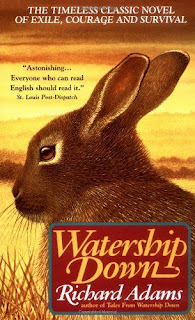This is the book I wanted to read and somehow got "The Wind in the Willows" instead - I don't regret it because "The Wind in the Willows" was beautiful and I loved it with all my heart - but they are completely different and its good that I read them both. In fact, even though it didn't look promising, it turned out that 2023 was good year for reading - I managed to read 14 books (out of 12 that I gave to myself as a task) and some of them were unforgettable indeed.
Where "The Wind in the Willows" was delightful and magical, this one was more like adventure story similar to "Lord of the Rings" in a way - the main characters were rabbits and the antagonists were all the predators that kill them, including dogs, foxes, cats and humans. There is a tiny rabbit with prophetic powers (Fiver) who warns his friends about upcoming danger so they escape their rabbit-town and finally reach their new destination after many dangerous adventures. This could have been the end of the book but it continues into another adventure when rabbits get in conflict with another rabit-town lead by tyrannical rabbit General Woundwort who is eventually outmanoeuvred and everything ends well, in fact the ending was just perfect, with a little bit of mysticism and animal religion thrown in as a nice touch.
"One chilly, blustery morning in March, I cannot tell exactly how many springs later, Hazel was dozing and waking in his burrow. He had spent a good deal of time there lately, for he felt the cold and could not seem to smell or run so well as in days gone by. He had been dreaming in a confused way--something about rain and elder bloom--when he woke to realize that there was a rabbit lying quietly beside him--no doubt some young buck who had come to ask his advice. The sentry in the run outside should not really have let him in without asking first. Never mind, thought Hazel. He raised his head and said, "Do you want to talk to me?"
"Yes, that's what I've come for," replied the other. "You know me, don't you?"
"Yes, of course," said Hazel, hoping he would be able to remember his name in a moment. Then he saw that in the darkness of the burrow the stranger's ears were shining with a faint silver light. "Yes, my lord," he said, "Yes, I know you."
"You've been feeling tired," said the stranger, "but I can do something about that. I've come to ask whether you'd care to join my Owsla. We shall be glad to have you and you'll enjoy it. If you're ready, we might go along now."
They went out past the young sentry, who paid the visitor no attention. The sun was shining and in spite of the cold there were a few bucks and does at silflay, keeping out of the wind as they nibbled the shoots of spring grass. It seemed to Hazel that he would not be needing his body any more, so he left it lying on the edge of the ditch, but stopped for a moment to watch his rabbits and to try to get used to the extraordinary feeling that strength and speed were flowing inexhaustibly out of him into their sleek young bodies and healthy senses.
"You needn't worry about them," said his companion. "They'll be all right--and thousands like them. If you'll come along, I'll show you what I mean."
He reached the top of the bank in a single, powerful leap. Hazel followed; and together they slipped away, running easily down through the wood, where the first primroses were beginning to bloom."







































